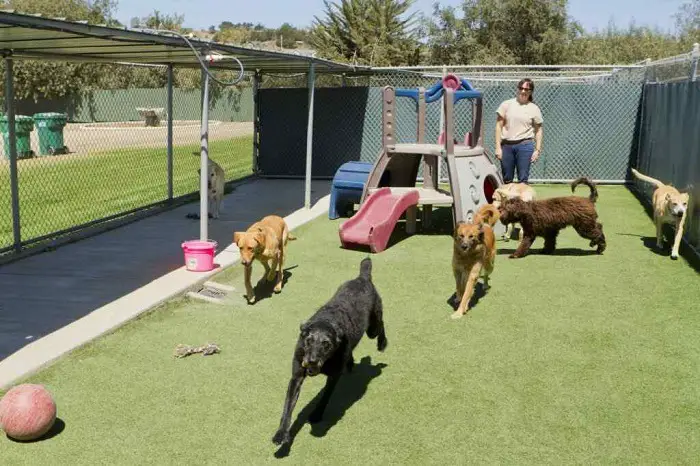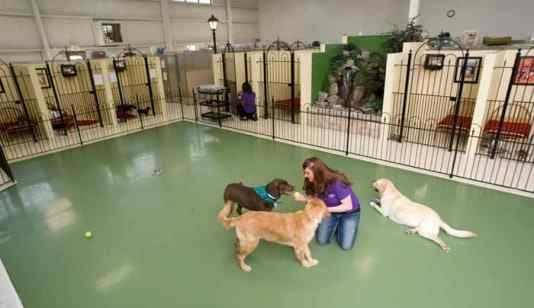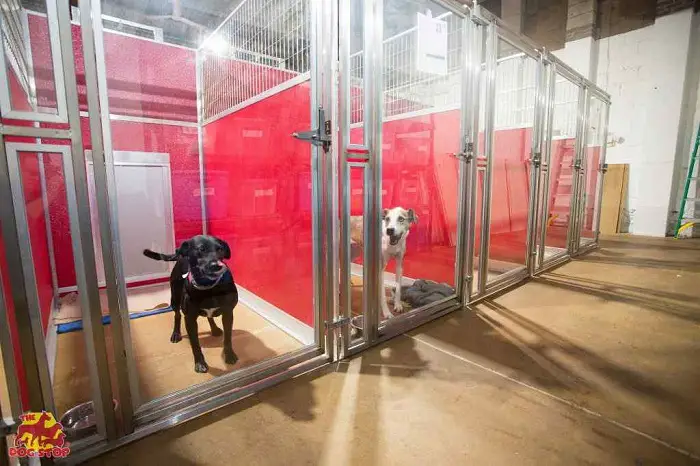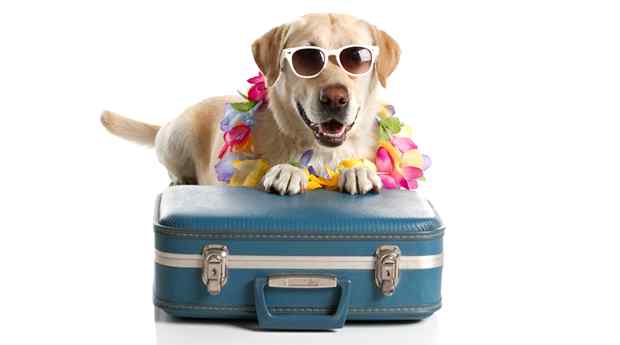Dog boarding refers to a service provided by professional facilities or individuals that allows dog owners to leave their dogs in a temporary care arrangement while away. It is an alternative to leaving the dog at home alone or relying on friends or family for pet care.
Dog boarding facilities are typically equipped to provide a safe and comfortable dog environment. They often have kennels, designated areas where dogs can stay, and outdoor spaces for exercise and socialization. If needed, boarding facilities may offer additional services such as feeding, grooming, training, and veterinary care.
When a dog is boarded, the owner typically drops off their pet at the boarding facility for a specific period, whether for a few days or several weeks. During their stay, dogs receive food, water, exercise, and attention from the staff. The staff ensures the dog’s well-being and addresses unique needs or requirements.
Why is Dog Boarding Necessary?
Dog boarding is necessary for several reasons:
- Care and Supervision: When dog owners are away for an extended period, they need a reliable option to ensure their dogs receive proper care and supervision. Boarding facilities provide a controlled environment where trained staff members can monitor the dogs, ensuring their safety and well-being.
- Socialization: Dogs are social animals and benefit from interactions with humans and other dogs. Boarding facilities often have dedicated play areas or socialization sessions where dogs can interact and engage in activities. This helps prevent loneliness and boredom during the owner’s absence.
- Exercise and Stimulation: Dogs require regular exercise and mental stimulation to stay healthy and happy. Boarding facilities typically provide daily exercise routines, such as walks or playtime, to keep dogs active and prevent behavioral issues that may arise from pent-up energy.
- Medical Attention: In a medical emergency or health issue, boarding facilities often have trained staff members to identify symptoms and provide immediate care. They may also have formed relationships with local veterinarians to address health concerns promptly.
- Peace of Mind: Leaving a dog at home alone for an extended period can cause anxiety and tension for both the owner and the pet. Dog boarding offers peace of mind to the owner, knowing that their dog is being cared for in a safe and secure environment with trained professionals.
- Convenience: Boarding facilities provide a convenient solution for dog owners who travel frequently or have commitments preventing them from temporarily caring for their dogs. Instead of relying on close friends or family, who may not always be available, owners can have a reliable option for their pet’s care.
Overall, dog boarding is necessary to ensure the well-being of dogs when their owners are away. It provides a structured and supervised environment that meets their physical, social, and emotional needs, allowing owners to handle their commitments confidently. At the same time, their dogs receive the necessary care and attention.
Dog Boarding Check List
When preparing to board your dog, it’s essential to have a checklist to make sure you have everything you need and that your dog’s stay is comfortable and stress-free. Here’s a dog boarding checklist to help you:
Before Boarding:
- Research: Thoroughly research boarding facilities in your area. Read reviews, visit the facility, and ask questions about their services, staff qualifications, and safety protocols.
- Vaccinations: Ensure your dog’s vaccinations are up to date. Most boarding facilities require proof of vaccinations, including rabies, distemper, and Bordetella (kennel cough).
- Reservations: Make a reservation to secure your dog’s spot, especially during peak times like holidays or vacations.
- Health Check: Schedule a pre-boarding health checkup with your vet to certify your dog is in good health and free of contagious conditions.
- Medications and Instructions: If your dog requires any medications, provide clear instructions to the boarding facility along with the medications, dosage details, and any special instructions from your veterinarian.
Packing Essentials:
- Food: Pack enough of your dog’s regular food to last the entire boarding period. It’s best to stick to their regular diet to avoid stomach upset. You can portion the food into individual bags for each meal.
- Treats: Include some of your dog’s favorite treats for rewards or occasional snacks.
- Medications: Pack all necessary medications along with clear instructions and dosage details.
- Bedding: If your dog has a favorite bed or blanket, you can pack it to provide a familiar scent and comfort during their stay.
- Toys: Include a few familiar toys to keep your dog entertained and provide a sense of familiarity.
- Leash and Collar: Bring a leash and collar for drop-off and pick-up, even if the facility provides its own.
- Contact Information: Provide your contact details, including your telephone number and emergency contact information, in case the boarding facility needs to reach you.
Drop-off and Instructions:
- Arrival Time: Arrive on time for the drop-off, allowing sufficient time to complete any necessary paperwork and provide additional instructions to the boarding facility.
- Instructions: Provide detailed instructions to the staff regarding your dog’s routines, feeding schedule, exercise needs, any behavioral concerns, and any other relevant information.
- Emergency Contacts: Provide emergency contact numbers for yourself, a trusted friend, and your veterinarian.
- Sign Consent Forms: Read and sign any required consent forms related to emergency veterinary care.
Remember, it’s essential to communicate openly with the boarding facility, ask questions, and address any concerns to ensure a regular and positive experience for you and your dog during their boarding stay.
Essential Considerations When Boarding Your Dog
When boarding your dog, remember several important considerations to ensure a positive experience for you and your furry friend. Here are some key considerations:
- Reputation and Reviews: Research a reputable boarding facility with positive reviews and a good track record of caring for dogs. Read testimonials or seek recommendations from trusted sources.
- Visit the Facility: Schedule a visit to the boarding facility beforehand to assess its cleanliness, safety measures, and overall environment. Observe the staff’s interaction with the dogs and inquire about their protocols for feeding, exercise, and emergencies.
- Vaccination Requirements: Ensure your dog’s vaccinations are current and provide the boarding facility with the necessary documentation. This protects your dog and other dogs from potentially contagious diseases.
- Health and Medications: Inform the boarding facility of any existing health conditions, allergies, or medications your dog requires. Provide detailed instructions, dosages, and the veterinarian’s contact information.
- Special Needs and Dietary Restrictions: If your dog has special dietary needs or restrictions, communicate them clearly to the boarding facility. Provide enough of your dog’s regular food to last their stay.
- Exercise and Socialization: Inquire about the exercise and socialization opportunities provided by the boarding facility. Dogs thrive on physical activity and social interaction, so ensure they will have access to appropriate exercise and playtime.
- Staff Qualifications and Training: Ask about the qualifications and training of the staff caring for your dog. Ensure they have experience handling and managing dogs of different sizes and temperaments.
- Communication: Maintain clear lines of communication with the boarding facility. Provide your contact information and emergency contact details, and ask how and when they will update you about your dog’s well-being during their stay.
- Emergency Procedures: Inquire about the facility’s emergency procedures in case of illness or injury. Ask about their access to veterinary care and how they handle emergencies.
- Comfort and Familiarity: Provide your dog with everyday items such as their bed, blanket, or favorite toys to make them feel more comfortable during their stay. These familiar scents can help reduce anxiety.
- Pre-Boarding Preparation: Give your dog thorough grooming and ensure they are clean and free of fleas or ticks before boarding. This helps maintain a healthy environment for all dogs at the facility.
- Relaxation Aids: If your dog experiences anxiety or stress, discuss with the boarding facility whether they allow relaxation aids like pheromone sprays or calming supplements.
By considering these factors, you can make an informed decision about the boarding facility and ensure that your dog has a safe, comfortable, and enjoyable experience while you are away.
What are the Facilities Available for Dog Boarding?
Dog boarding facilities offer a range of amenities and services to ensure the comfort, well-being, and enjoyment of the dogs in their care. While specific offerings may vary depending on the facility, here are some shared facilities and services available in dog boarding:
- Kennels or Sleeping Areas: Boarding facilities typically provide individual kennels or sleeping areas where each dog can have space. These areas are designed to provide comfort and security, with bedding or mats for dogs to rest on.
- Outdoor Play Areas: Many boarding facilities have outdoor spaces where dogs can play, exercise, and socialize. These areas may include fenced yards, grassy fields, or designated play zones. They provide opportunities for dogs to stretch their legs, run around, and engage in physical activities.
- Indoor Play Areas: Some boarding facilities have indoor play areas besides outdoor spaces. These areas are beneficial during inclement weather or for dogs that prefer indoor activities. They may have toys, climbing structures, and agility equipment to keep dogs entertained and active.
- Feeding Areas: Boarding facilities have designated feeding areas where dogs are provided with their meals. Some facilities offer communal feeding, while others provide individual feeding stations to ensure each dog receives their specific diet and portion.
- Bathing and Grooming: Many boarding facilities offer bathing and grooming services for dogs during their stay. This can include baths, brush-outs, nail trims, and ear cleaning. Grooming services may be available upon request or as part of a package.
- Training or Enrichment Programs: Some boarding facilities offer training or enrichment programs to provide dogs with mental stimulation and behavioral development. This can include basic obedience training, puzzle toys, scent games, or other activities designed to engage and challenge the dogs.
- Veterinary Care: Boarding facilities often have protocols to handle medical emergencies or health issues that may arise during a dog’s stay. They may have access to on-site veterinary care or a partnership with a local veterinarian to ensure prompt attention if needed.
- Special Care or Services: Depending on the facility, additional services may be available, such as administering medications, providing special diets, accommodating dogs with specific needs or medical conditions, or offering one-on-one playtime or cuddle sessions.
- Security and Safety Measures: Boarding facilities prioritize the safety and security of the dogs in their care. This can include secure fencing, controlled access to the facility, surveillance cameras, and trained staff members who monitor the dogs’ activities.
It’s important to note that the available facilities and services can vary from one boarding facility to another. When selecting a facility, consider your dog’s specific needs and preferences and choose a boarding facility that aligns with those requirements.
How to Choose a Good Dog Boarding?
Choosing a good dog boarding facility is essential to ensure your pet’s safety, comfort, and well-being while you are away. Here are some essential factors to consider when selecting a dog boarding facility:
- Research and Visit: Conduct thorough research on local boarding facilities. Read reviews and gather recommendations from trusted sources. Visit the facilities in person to assess cleanliness, safety measures, and the overall environment.
- Accreditation and Licensing: Check if the boarding facility is accredited or licensed by relevant authorities. This ensures that they meet specific standards and regulations for animal care and facility management.
- Staff Qualifications and Experience: Inquire about the qualifications and experience of the staff caring for your dog. Ensure they have experience handling dogs of different sizes, breeds, and temperaments. Ask about their training in animal care and behavior.
- Health and Safety Protocols: Ask about the facility’s health and safety protocols. This includes vaccination requirements, hygiene practices, pest control measures, and emergency procedures. The facility should have clear protocols to handle medical emergencies and provide veterinary care if needed.
- Size and Space: Consider the size and space available at the facility. Dogs should have enough space to move around comfortably indoors and outdoors. Adequate space allows for exercise, play, and socialization.
- Exercise and Socialization Opportunities: Inquire about the exercise and socialization opportunities provided by the facility. Dogs should have regular access to exercise areas and opportunities to interact with other dogs if appropriate. Physical activity and socialization are crucial for their well-being.
- Feeding and Medication: Ensure the facility accommodates your dog’s dietary needs. If your dog requires medication, inquire about their ability to administer it correctly and on schedule.
- Communication and Updates: Ask about the facility’s communication policy. They should be able to update your dog’s well-being during their stay regularly. Inquire about their methods to keep you informed, such as phone calls, emails, or photo updates.
- Compatibility and Special Needs: Consider your dog’s needs, temperament, and compatibility with other dogs. Discuss any special requirements, such as dietary restrictions, medical conditions, or behavioral concerns, with the boarding facility to ensure they can accommodate your dog appropriately.
- Trust and Gut Feeling: Trust your instincts when selecting a boarding facility. If something doesn’t like right or you have concerns, it may be best to explore other options.
- Visit During Busy Times: Visit the facility during busy times like drop-off or pick-up hours. This lets you see how staff members interact with dogs and manage the facility during peak times.
By considering these factors and conducting thorough research, you can choose a reputable and trustworthy dog boarding facility that provides a safe, comfortable, and enjoyable experience for your beloved pet.
Final Talk on Dog Boarding
Dog boarding provides a valuable service for owners who need temporary care for their pets while away. It ensures that dogs are well-cared for, receive necessary attention, exercise, and socialization, and remain in a safe and supervised environment. Boarding facilities offer a range of amenities and services, including individual kennels or sleeping areas, outdoor and indoor play areas, feeding stations, grooming services, training programs, and access to veterinary care.
When selecting a dog boarding facility, it’s crucial to conduct thorough research, visit the facility in person, and consider factors such as staff qualifications, health, and safety protocols, exercise and socialization opportunities, reviews and recommendations, and communication practices. Trust your instincts and choose a facility that aligns with your dog’s needs and provides a sense of trust and comfort.
Before boarding your dog, ensure vaccinations are current, provide clear instructions for any medications or special needs, and pack essential items such as food, treats, bedding, toys, and contact information. During drop-off, communicate any specific instructions or concerns to the boarding facility, and establish clear lines of communication for updates on your dog’s well-being.
By carefully selecting a reputable boarding facility and adequately preparing for your dog’s stay, you can be satisfied knowing that your lovely pet is in better hands while you’re away. Dog boarding allows you to fulfill your commitments or enjoy your time away while your dog receives the care, attention, and socialization they need in a safe and nurturing environment.



